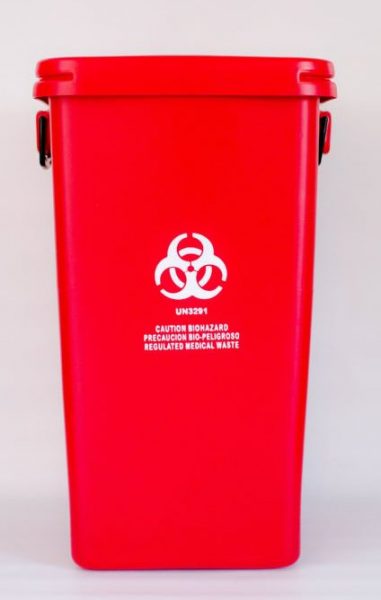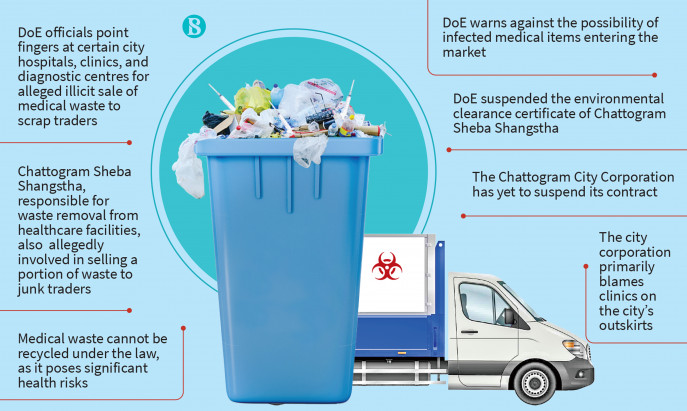Guardians of Cleanliness: Local Medical Waste Removal Service for Your Peace of Mind
Guardians of Cleanliness: Local Medical Waste Removal Service for Your Peace of Mind
Blog Article
Keep Ahead of Laws: Specialist Advice on Medical Garbage Disposal
In a world where the medical care industry is frequently developing, it is vital for medical centers to stay ahead of laws when it concerns the correct disposal of clinical waste. With rigorous standards and constant governing modifications, it can be testing to browse the complexities of this process. With skilled guidance, facilities can guarantee conformity and alleviate risks connected with improper waste disposal. From understanding the different classifications of medical waste to carrying out the appropriate collection and segregation approaches, this conversation will certainly provide beneficial insights and actionable tips to aid centers stay ahead of laws in the ever-changing landscape of clinical garbage disposal.
Recognizing Clinical Waste Categories
Comprehending medical waste groups is important for proper disposal and monitoring in medical care facilities. Medical waste refers to any waste generated by medical care tasks that might position a hazard to public health or the setting. It is crucial to classify medical waste accurately to ensure its risk-free handling, therapy, disposal, and transport.
There are numerous groups of medical waste that healthcare centers need to be acquainted with. One of the most typical groups consist of infectious waste, pathological waste, sharps waste, pharmaceutical waste, and chemical waste. Each classification has particular guidelines and laws for its correct administration and disposal.
Pathological waste refers to human tissues, body organs, or body parts that require special handling and disposal. Drug waste consists of ended, extra, or contaminated drugs that need mindful handling and disposal.
Remaining Up-To-Date With Regulatory Adjustments
Remaining existing with governing adjustments is crucial for healthcare centers to guarantee compliance and appropriate management of clinical garbage disposal. medical waste removal service. With laws frequently developing, it is vital for medical care centers to remain updated to prevent fines, penalties, and potential injury to the atmosphere and public health and wellness
To stay in advance of regulatory adjustments, health care facilities ought to develop a system for surveillance and tracking updates. This can be done by registering for regulatory e-newsletters, going to seminars and workshops, and actively taking part in market associations. Additionally, centers need to assign a personnel participant or group in charge of staying educated and disseminating details to appropriate stakeholders.
Routine interaction with governing agencies is likewise important. Health care centers must establish relationships with local, state, and government firms to ensure they understand any type of adjustments in regulations that may impact their waste management practices. This can be done through regular conferences, participation in public remark periods, and aggressive engagement with governing firms.
Additionally, healthcare centers should think about partnering with waste monitoring business that specialize in medical garbage disposal (medical waste disposal services with WasteX). These business are usually fluent in the current regulations and can supply assistance and support to guarantee conformity
Carrying Out Correct Collection and Partition Methods
To efficiently handle clinical garbage disposal, medical care centers have to establish appropriate collection and partition approaches in accordance with regulatory guidelines. Executing these methods makes certain the secure handling and disposal of potentially harmful products, protects the setting, and lessens the risk of injuries and infections to medical care workers and the public.
Appropriate collection and segregation approaches include the use of marked containers and identifying systems. Health care centers need to supply plainly identified containers for various kinds of medical waste, such as sharps, transmittable waste, pharmaceutical waste, and non-hazardous waste. These containers ought to be color-coded and clearly marked to prevent confusion and promote easy recognition.
Additionally, health care facilities must train their team on the proper procedures for collecting and segregating clinical waste. This includes informing them on the various types of waste, the suitable containers to utilize, and the relevance of following laws and guidelines. Normal training sessions and refresher course programs ought to be performed to ensure that employee stay up-to-date on finest techniques.
Moreover, healthcare facilities should develop a system for routine collection and disposal of clinical waste. This might involve partnering with accredited waste monitoring firms that focus on medical garbage disposal. These business will certainly guarantee that the accumulated waste is delivered and dealt with content in conformity with governing demands.
Picking the Right Disposal Techniques

Incineration is just one of the most effective and usual approaches for throwing away specific kinds of medical waste, such as pathological waste and sharps. It includes the regulated combustion of waste at high temperature levels, reducing it to ash. Incineration can release damaging contaminants into the air and add to air contamination.

Chemical treatment entails the usage of chemicals to reduce the effects of the waste and disinfect. Microwave treatment utilizes microwave power to heat and sanitize the waste.
Making Sure Conformity Via Documentation and Training
After carefully taking into consideration the ideal disposal techniques for clinical waste, health care centers should ensure compliance with laws and decrease ecological influence by applying effective documentation and training procedures. This action is vital in keeping a lasting and safe atmosphere for both health care employees and the public.

Healthcare workers who handle medical waste ought to obtain ideal training on waste partition, managing, and disposal treatments. By giving thorough training, healthcare centers can empower their staff to make educated decisions and lessen the danger of improper waste disposal.
Conclusion
Finally, staying ahead of policies in medical waste disposal is essential for health care centers. medical waste removal service. Comprehending the different categories of clinical waste, remaining updated with governing changes, applying correct collection and partition methods, selecting the ideal disposal methods, and ensuring compliance with paperwork and training are all crucial actions. By adhering to these guidelines, healthcare organizations can efficiently dispose and manage of medical waste in a secure and accountable fashion
From comprehending the different groups of medical waste to carrying out the best collection and partition methods, this conversation will supply actionable suggestions and valuable understandings to aid facilities remain in advance of policies in the ever-changing landscape of clinical waste disposal. - medical waste disposal services with WasteX
The most common categories consist of transmittable waste, pathological waste, sharps waste, pharmaceutical waste, and chemical waste. Health care facilities need to supply plainly identified containers for different types of clinical waste, such as sharps, contagious waste, pharmaceutical waste, and non-hazardous waste. Health care centers need to develop a thorough system to tape-record and track all facets of clinical waste disposal, including types of waste created, quantities, and disposal techniques utilized. Healthcare employees that manage Your Domain Name clinical waste ought to get appropriate training on waste partition, managing, and disposal procedures.
Report this page